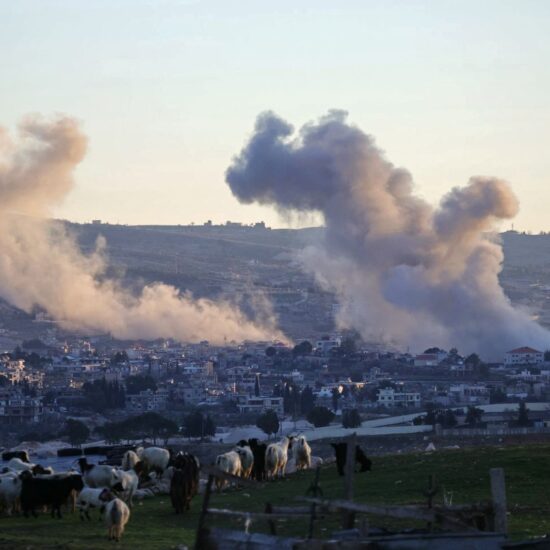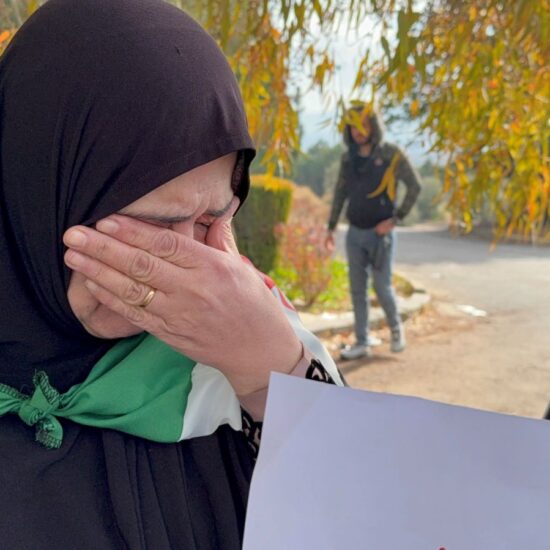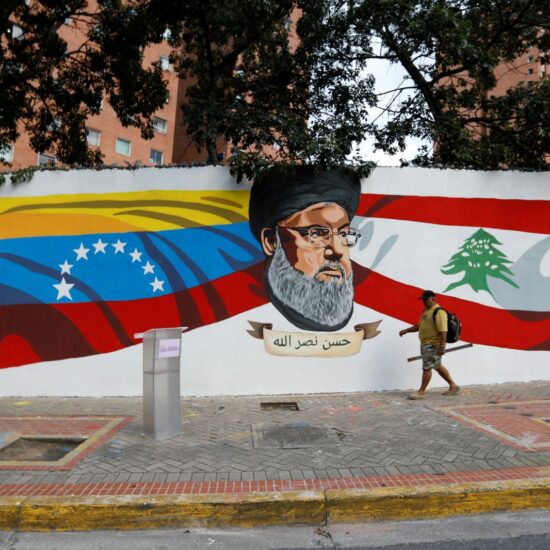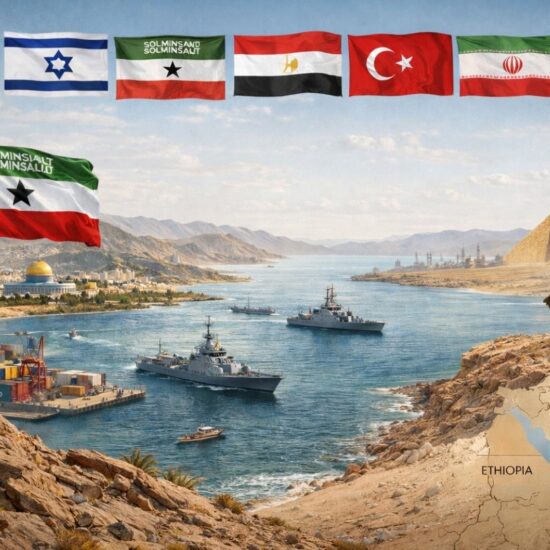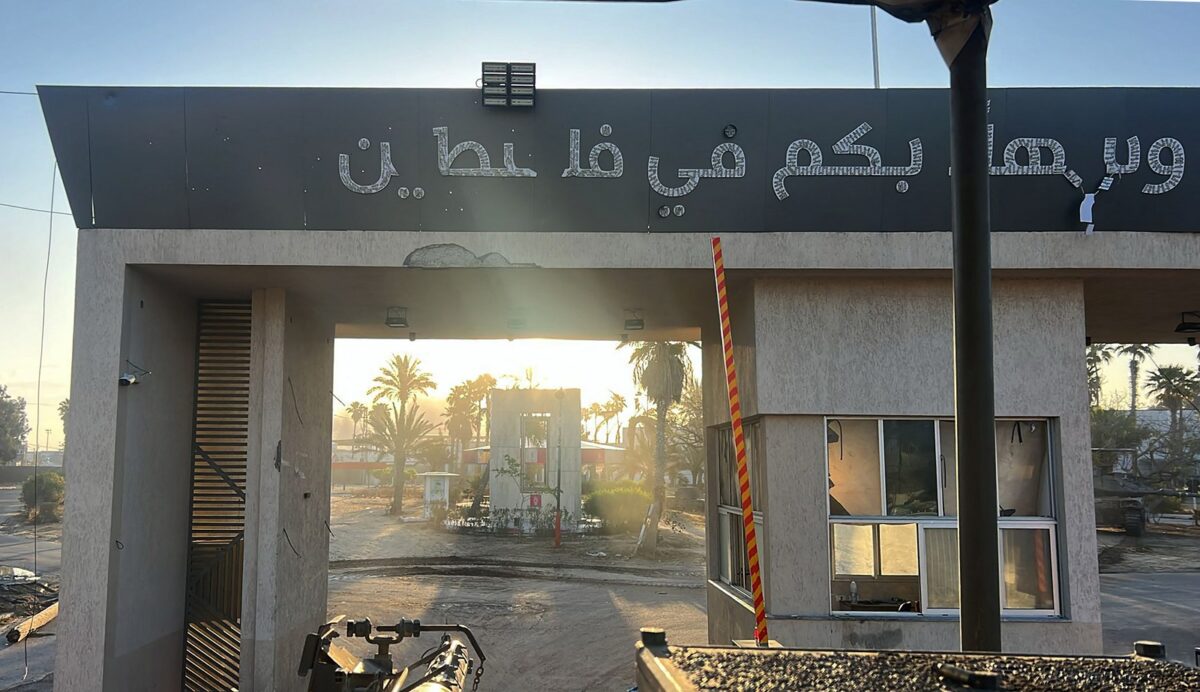
After the news of a ceasefire circulated online over the weekend, the joy of the Palestinians in Gaza was short-lived as they woke up on Monday, May 6, with the Israeli military command warning them to evacuate Rafah, threatening it is about to use “extreme force in southern Gaza.”
Amidst flyers cascading from above, SMS alerts, and social media announcements, the impending Israeli military operation in the region seems poised to unfold as another harrowing chapter in the live broadcast of this ongoing genocide.
According to the Israeli spokesperson Avichay Adrai, there has been an expansion of the so-called “humanitarian zone” in the Mawasi area. Allegedly, this expansion is accompanied by the forced evacuation of Palestinians from eastern Rafah, which supposedly was designated as the initial “safe zone.”
Rafah, Gaza’s last bastion of refuge, now hangs ominously under the looming threat of invasion. With the Egyptian border firmly closed off, the question remains where can displaced Gazans turn. For the 100,000 out of 1.4 million Palestinians already displaced in Rafah, the grim options boil down to facing either death or yet another forced displacement.
As the merciless genocide stretches into its seventh month, a glimmer of hope flickered briefly on Sunday with rumors of a ceasefire. Yet, one can’t help but question whether this was a calculated maneuver, a psychological ploy by the Israelis to momentarily uplift spirits before shattering them entirely, along with what little remains of Gaza’s sanctuary.
May 5, 2024: Israel’s Defense Minister Yoav Gallant announced plans for a ground attack on Rafah, citing a recent Hamas assault that left ten individuals injured. Gallant, while inspecting Israeli forces in the Netzarim axis, claimed that Hamas’ alleged reluctance to engage in peace talks with Israel necessitates military action not only in Rafah but across the entire Gaza Strip.
This development comes as the Israeli government decided to shut down Al Jazeera media offices in the country.
Israel PM Benjamin Netanyahu posted the decision on X, stating in Hebrew that “the government headed by me unanimously decided: the incitement channel Al Jazeera will be closed in Israel.”
Israel’s Communications Minister Shlomo Karhi confirmed the closure, stating that he had signed immediate orders against Al Jazeera. Karhi specified the seizure of broadcasting equipment, including editing tools, cameras, and transmission gear, highlighting the comprehensive nature of the crackdown.
That same day, UNRWA’s head said Sunday that he had been barred from entering Gaza for the second time in a week by Israeli authorities.
“Just this week, they have denied – for the second time – my entry to Gaza where I planned to be with our UNRWA colleagues including those on the front lines,” Philippe Lazzarini posted on X.
Israeli media reports suggest that CIA chief William Burns, a key mediator in the peace talks, is scheduled to meet with Prime Minister Netanyahu today. According to an official familiar with the matter, Burns is slated to meet with the Prime Minister of Qatar, a key intermediary along with Egypt in dealing with Hamas. However, it remains uncertain whether Burns will proceed with a planned subsequent trip to Israel. The official, speaking on condition of anonymity to discuss confidential negotiations, disclosed these details.
Egyptian state media confirmed that the Hamas delegation engaged in discussions in Qatar, where the group maintains a political office. The delegation is expected to return to Cairo for further negotiations on Tuesday, May 7.
In Lebanon
TikTok human trafficking: The entire nation of Lebanon was shaken last week by the uncovering of an alleged child sex trafficking ring involving a well-known TikTok influencer. Last week, at least six individuals were arrested following an extensive investigation prompted by complaints from children. Authorities confirmed the arrests on Wednesday, May 1st, revealing disturbing details of sexual assaults, drug usage, and photographing by an organized gang in several hotel locations, as reported by Lebanon’s Internal Security Forces.
The influencer at the center of the controversy was identified as George Moubayed, a prominent hairdresser and owner of the men’s salon Hair Zone. Media outlets have suggested his involvement as the alleged leader of the child trafficking network. Those arrested are accused of using various deceptive tactics, including online impersonation and promises of fame, to lure minors into compromising situations.
Brutally assaulted and killed: On Saturday, May 4, a horrifying incident occurred at the Universel Hotel in the Rawshe area. Zainab Maatouk, an employee at the hotel, was subjected to a brutal assault, rape, and severe beating by K.B., a Syrian national.
Tragically, an examination revealed that Zainab had passed away due to internal bleeding resulting from the assault.
The Information Branch, responsible for leading the investigation, has turned its attention towards multiple suspects, with K.B. emerging as a primary focus. Despite having resigned from the hotel previously, K.B. was reportedly seen frequenting the premises. Witnesses also noted a heated argument between K.B. and Zainab in the hotel lobby on the evening of the crime.
New aid package: EU Commission President Ursula von der Leyen has announced a financial package totaling one billion euros for Lebanon, spread over the years from 2022 to 2027. This aid aims to bolster Lebanon’s socioeconomic stability. Already, a portion of this funding, allocated in January 2023, was designated for administrative reforms, water, and energy projects, but it remains undispersed. Lebanon is slated to receive around two-thirds of the remaining funds from this package. Notably, 30 million euros will be earmarked for military and security institutions, specifically to enhance border control and stem illegal refugee influx into Europe.
Mays al Jabal’s atrocity: An Israeli aircraft targeted a house in Mays Al Jabal on Sunday, May 5, resulting in the deaths of 3 civilians and the injury of a member of the Civil Defense.
In the Region
Soured relationship: Turkey has suspended all trade with Israel due to the “worsening humanitarian tragedy” in the Palestinian territories. Israeli Foreign Minister, Israel Katz, strongly criticized the decision stating that Turkey’s president Recep Tayyip Erdoğan is acting like a “dictator.”
In early April, Turkey’s Trade Ministry initiated export restrictions to Israel, halting the export of iron and steel products along with construction equipment. The trade volume between the two nations amounted to 6.8 billion dollars in 2023.
Katz said Erdoğan was “breaking agreements by blocking ports for Israeli imports and exports. This is how a dictator behaves, disregarding the interests of the Turkish people and businessmen, and ignoring international trade agreements.”
Bakeries crackdown: Egyptian authorities are cracking down on bakeries to ensure compliance with government-mandated price controls on bread, the staple food for the nation’s 114 million people. In Al Obour, a satellite city of Cairo, agents are conducting inspections at bakeries producing non-subsidized bread, known as “tourists’ bread,” to verify adherence to weight and price regulations, as stated by the Consumer Protection Agency. This enforcement effort coincides with a recent decline in flour prices, dropping by over a third since late last month to 14,000 Egyptian pounds per tonne.
New Oil price hike: Oil futures rose following Saudi Arabia’s decision to increase June crude prices for most regions. This news, coupled with slim prospects of a Gaza ceasefire deal, renewed concerns about the potential widening of the Israel-Hamas conflict in the critical oil-producing region. Brent crude futures climbed 51 cents, or 0.6%, reaching 83.47 dollars a barrel at 0636 GMT, while US West Texas Intermediate crude futures stood at 78.64 dollars a barrel, up 53 cents, or 0.7%. Last week saw both futures contracts registering their most significant weekly decline in three months, with Brent falling more than 7% and WTI dropping 6.8%. Investors pondered over weak US jobs data and speculated about the timing of a Federal Reserve interest rate cut.
What We’re Reading
Not entirely Social: In this article, NOW’s economist Maan Barazy examined how social media is being weaponized in the Middle East conflict. In Lebanon, activists reported security agents accessing WhatsApp messages without seizing phones, using the information for political intimidation. Additionally, Israeli intelligence has developed an AI program called Lavender, which uses WhatsApp data to identify targets for airstrikes. Meanwhile, a TIME magazine report reveals a contract between Google and the Israeli Security Ministry, granting access to Google Cloud and AI services for data storage and processing, part of a 1.2 billion dollars deal involving Google, Amazon, and the Israeli government.
Higher exposure and marketing: In her latest article for NOW, journalist Rodayna Raydan explored Lebanon’s economic crisis, marked by the significant devaluation of the Lebanese pound. This devaluation has hit businesses and consumers hard, leading to increased costs of imports and widespread business closures, particularly among smaller enterprises.
The Horeca exhibition in Lebanon, focusing on hospitality and food service, serves as a key event for businesses to showcase their offerings, network, and stay updated on industry trends. Participating businesses, like Grapeful, see it as a chance to boost visibility, generate sales, and explore new markets.
Amidst the country’s economic challenges, Lebanese businesses are adapting their strategies to optimize costs, target markets effectively, and capitalize on local and international opportunities.
Between Peace and Conflicts: In this analysis, political psychologist Ramzi Abou Ismail explored the pivotal moment facing the Middle East, where the region’s geopolitical landscape stands on the cusp of significant change. Current events have outlined two potential trajectories: one leading towards peace and regional normalization, while the other risks further conflict and isolation. At the heart of this juncture lies the active involvement of both global and regional powers, each maneuvering to shape outcomes in alignment with their strategic interests. The United States is at the forefront of efforts to encourage Israel to engage in peace negotiations, leveraging the possibility of waiving sanctions on specific military units implicated in the Gaza conflict. Concurrently, the US, alongside Saudi Arabia and other Arab states, is spearheading initiatives to devise a comprehensive peace plan. This plan aims to establish a Palestinian state and foster normalization between Israel and its Arab neighbors, signaling a genuine commitment to resolving longstanding regional disputes.
Lebanon +
The latest episode of “Donotworrypodcast” delves into the shocking Hairzone allegations, as Anthony and the crew dissected the latest developments surrounding social media influencers in Lebanon. Additionally, they explored the news of Dr. Food and Shrouq’s divorce, shedding light on the complexities of relationships within this digital sphere. The episode navigates the blurred lines between social media personas and real-life experiences.



